Information/Write-up
Exploring the life of George Hector provides insight into the musical heritage that echoed through the lives of African Canadian communities in the Maritime provinces. The term “Africadians,” introduced by George Elliott Clarke, a former Poet Laureate of Canada, represents these historical communities found in both New Brunswick and Nova Scotia.
The narrative of Canada being entirely free from slavery is accurate only if one starts the country’s history from 1867. In fact, slavery was a reality in Canada prior to its Confederation, with a slow process of abolition that initially allowed immigrants to retain their slaves upon their arrival in Canada.
George Hector’s experiences are set in and around Gagetown, a place where slave-built houses were still present when Anne Fawcett documented his life in the 1999 biography “Whistling Banjoman – George Hector.”
The number of slaves locally was relatively small, and as abolition efforts grew, Upper and Lower Canada became refuges for American slaves seeking freedom. The British offered land to African Americans who fled north to assist in suppressing the American Revolution. These land grants, offered to support the British cause, eventually became Canadian land grants following Britain’s defeat in the war.
Africville stands as the most renowned Africadian settlement, yet numerous smaller and more secluded communities were scattered throughout New Brunswick. Given their limited population, making a livelihood was challenging. Residents struggled to earn whatever income they could, while also engaging in activities essential for self-sufficiency, such as farming, trapping, and ice cutting during the winter months.
George Hector was born into this backdrop on April 14, 1911, in a time when medical facilities were scarce, necessitating home births without a doctor. His father once assisted a doctor in amputating a neighbour’s leg, a stark example of the medical practices of the time.
The elder Hector was a man of many trades, managing a 30-kilometer mail route, clearing snow for the Canadian Pacific Railway, driving cattle, working at the Saint John port, and serving as a deckhand on New Brunswick’s riverboats.
As George grew up, he engaged in trapping, particularly focusing on muskrats, and working on cable ferries. Political dynamics in early 20th century New Brunswick heavily influenced employment, with a system where political affiliation determined job security. This meant that when the Conservatives, whom Hector’s family supported, lost an election, those in government-supported jobs, including Hector, faced unemployment until the next political shift.
George Hector’s musical journey began in a home filled with music, with his mother playing the accordion. Although he didn’t formally study music, he naturally gravitated towards it, quickly learning to play by ear. The local musical landscape was a blend of British Isles tunes and African American gospel.
At a very young age, around 3 or 4 years old, Hector was already singing songs like “It’s a Long Way to Tipperary.” He grew up immersed in spiritual songs from the South, learned through his parents. His first musical experiment was with his mother’s button accordion, but it wasn’t long before he was drawn to the banjo.
This marked the beginning of a lengthy career spanning over seventy years, primarily playing at local square dances. At that time, guitars were uncommon; banjo music reigned supreme in the early 20th century.
This trend was exemplified by The Bohee Brothers, African Canadians from Saint John, who were possibly the first Canadians to release a recording. They found success both in Canada and later in England.
Hector’s fascination with the banjo was sparked after hearing it on an early Victrola owned by a railroad manager. His determination to play the instrument led him to craft his own makeshift banjo using a tobacco can and violin strings, as he had never seen a real banjo up close.
Eventually, his father bought him a genuine banjo in Fredericton, and Hector found a teacher who had recently moved from New York. He soon began playing at country dances. Alongside his music, Hector held various jobs, including a well-paid position as a chauffeur during the Depression.
In 1938, Don Messer, passing through the area, hired Hector and featured him as “The Singing Chauffeur” on a radio show in Saint John. Hector’s whistling skills led to his new moniker, “The Whistling Banjoman.”
Hector and a few local players established “The Maritime Farmer Barn Dance”, which ran once a week for 20 years. As TV became more affordable, the Farmers’ radio show moved to the new format, still paying six dollars a week per man.
Don Messer relocated his show to PEI, and became a Canadian television staple for many years. Hector declined Messer’s invitation to head east from New Brunswick, but Hector was comfortable where he was, and stayed in New Brunswick.
Intriguingly, in his biography, Hector mentioned acetates of radio shows which were routinely recorded; the were 18” plates which “was cut from a groove as it went along. The stuff had to be taken off. And you’d see them with a pencil winding that stuff up just to keep it from clogging the needle. They done that every radio programme. They must have had tons of them.” One wonders if any acetates of 1940’s Canadian radio shows have survived and are sitting somewhere, ignored. These acetates predated tape, and likely would have better survived the last 80 years.
George Hector faced challenges in his musical career, particularly when he tried to establish himself at The New Moon Dance Hall in Saint John. During the negotiation process, the new owners were reluctant to acknowledge him as a leader due to his race. Hector reflected on this missed opportunity, wishing he had formed and legally protected his own band, similar to how Don Messer and His Islanders operated.
Despite this setback, Hector continued to perform live. He also worked in construction, a job that nearly cost him his life in a 1968 accident. In the mid-1960s, he briefly moved to Toronto, but was concerned about not being accepted into the local musicians’ union and losing his longstanding job shoveling snow for the Canadian Pacific Railway, a position he had held for 20 years.
In 1982, Hector released his only album, a compilation of banjo instrumentals featuring Ned Landry on the fiddle and some original songs sung by Hector himself. Later in the 1980s, he released a cassette titled “Further Along.” However, most of Hector’s performances were at local fairs and square dances, where he played a vital role in keeping the tradition alive.
George Hector Album Cover
Hector was likely the first Africadian to regularly appear on Maritime television and possibly the first to record an album since the departure of the Bohee Brothers from New Brunswick nearly a century earlier.
George Hector passed away on October 17, 2004, at the age of 93, leaving behind a legacy in the Maritime music scene.
A prominent figure in New Brunswick country music, Hector was inducted into the New Brunswick Country Music Hall of Fame and received the ECMA’s Stompin’ Tom Award.
-mynewbrunswick.ca
George Hector: banjo, vocals
Ned Landry: fiddle
Norm Hamilton: piano
Sonny Weyman: bass
Cover photography by Lorne Pridham
Jacket design by Gerry Taylor
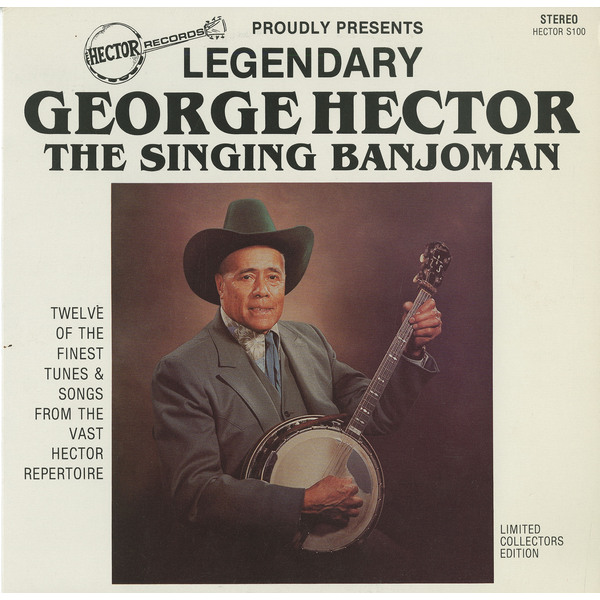
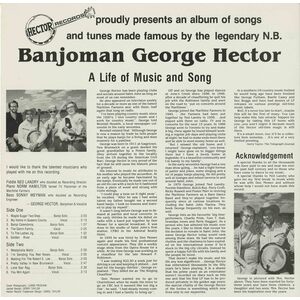
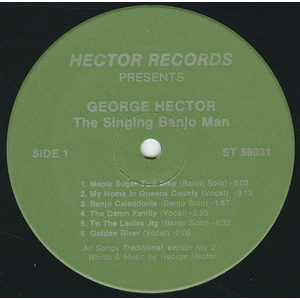
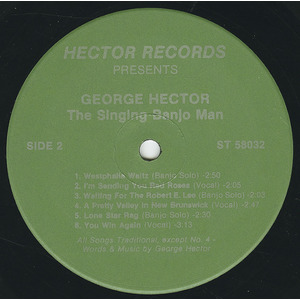
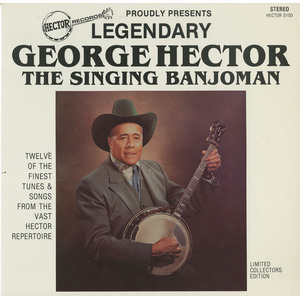
No Comments